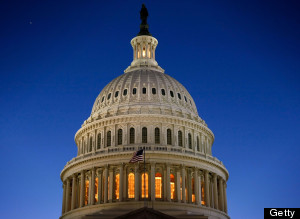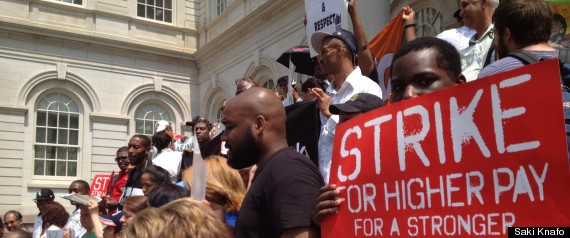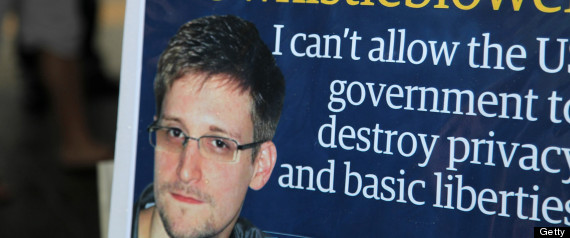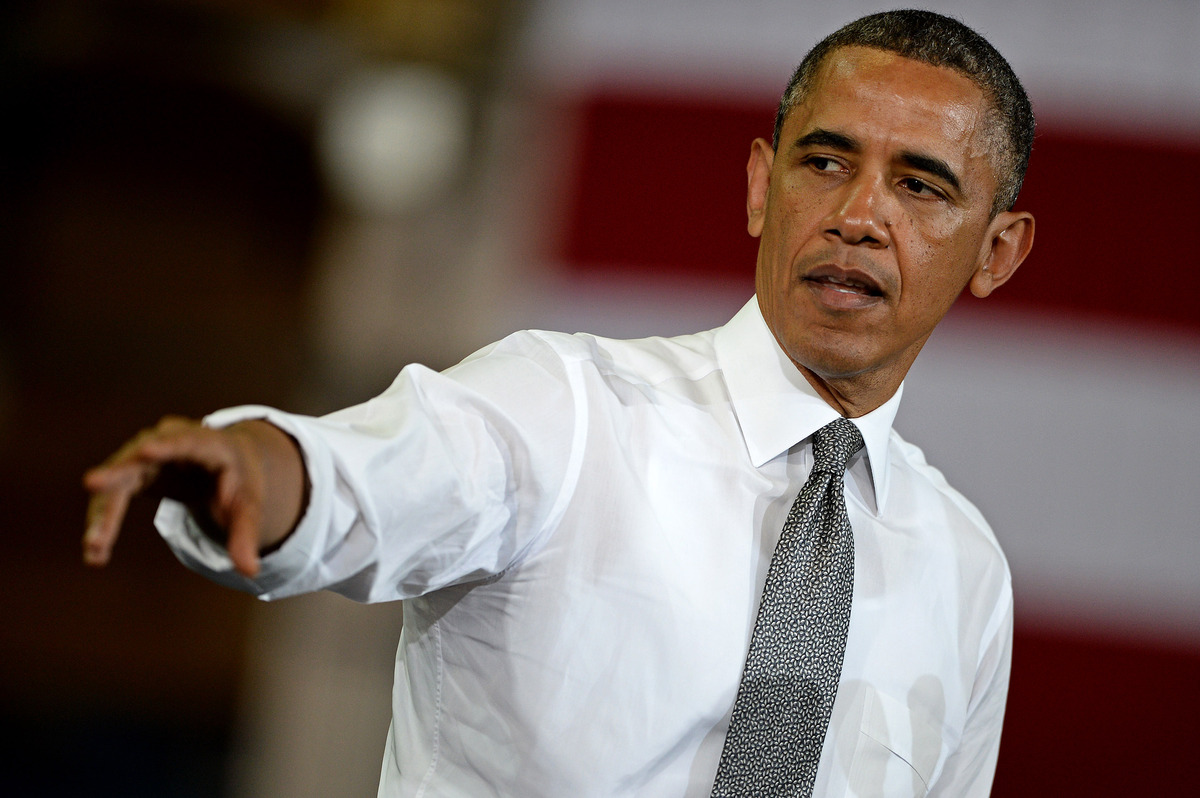A FAMILIAR face appeared in many of the protests taking place in scores of cities on three continents this week: a Guy Fawkes mask with a roguish smile and a pencil-thin moustache. The mask belongs to “V”, a character in a graphic novel from the 1980s who became the symbol for a group of computer hackers called Anonymous. His contempt for government resonates with people all over the world.
Democracy Gone Astray
Democracy, being a human construct, needs to be thought of as directionality rather than an object. As such, to understand it requires not so much a description of existing structures and/or other related phenomena but a declaration of intentionality.
This blog aims at creating labeled lists of published infringements of such intentionality, of points in time where democracy strays from its intended directionality. In addition to outright infringements, this blog also collects important contemporary information and/or discussions that impact our socio-political landscape.
All the posts here were published in the electronic media – main-stream as well as fringe, and maintain links to the original texts.
[NOTE: Due to changes I haven't caught on time in the blogging software, all of the 'Original Article' links were nullified between September 11, 2012 and December 11, 2012. My apologies.]
Friday, June 28, 2013
It’s Not Just the Interest Rate: How Congress Can Help Students
Judging from the proposals being discussed, it looks like the best Congress can do is to retroactively extend current rates for a year, and take up the thornier question of a long-term fix when the Higher Education Act comes up for reauthorization in 2014.
NSA Surveillance Prompts Several Bills But Little Action In Congress
WASHINGTON -- In the three weeks since Edward Snowden revealed the National Security Agency's widespread surveillance programs, the legislative response to his revelations on Capitol Hill has slowed to a glacial pace and public obsession has noticeably shifted from a debate on national security versus privacy to Snowden's latest whereabouts.
Civil liberties advocates in Congress introduced a slew of bills in response to reports that the NSA has been collecting phone records from millions of Americans and mining electronic communications from nine major Internet companies:
Sen. Rand Paul (R-Ky.) proposed legislation would require the federal government to have a warrant based on probable cause in order to seize phone records from Americans;
Sens. Mark Udall (D-Colo.) and Ron Wyden (D-Ore.), who long warned of the government's surveillance methods, are seeking to limit the government's authority to collect data;
Unusual bedfellows Sens. Jeff Merkley (D-Ore.) and Mike Lee (R-Utah) co-sponsored a bill that would declassify FISA court opinions;
And this week, Senate Judiciary Committee Chairman Patrick Leahy (D-Vt.) introduced legislation to revisit the Patriot Act Section 215 and FISA Amendment Act Section 702, under which the NSA programs are lawful.
Civil liberties advocates in Congress introduced a slew of bills in response to reports that the NSA has been collecting phone records from millions of Americans and mining electronic communications from nine major Internet companies:
Sen. Rand Paul (R-Ky.) proposed legislation would require the federal government to have a warrant based on probable cause in order to seize phone records from Americans;
Sens. Mark Udall (D-Colo.) and Ron Wyden (D-Ore.), who long warned of the government's surveillance methods, are seeking to limit the government's authority to collect data;
Unusual bedfellows Sens. Jeff Merkley (D-Ore.) and Mike Lee (R-Utah) co-sponsored a bill that would declassify FISA court opinions;
And this week, Senate Judiciary Committee Chairman Patrick Leahy (D-Vt.) introduced legislation to revisit the Patriot Act Section 215 and FISA Amendment Act Section 702, under which the NSA programs are lawful.
Bloomberg: 'Nobody Racially Profiles'
Mayor Michael Bloomberg lashed out Friday morning at two bills recently passed by the New York City Council that aim to check the NYPD's controversial use of stop and frisk.
"The racial profiling bill is just so unworkable," he told host John Gambling during his weekly radio appearance, Capital New York reports. "Nobody racially profiles."
"The racial profiling bill is just so unworkable," he told host John Gambling during his weekly radio appearance, Capital New York reports. "Nobody racially profiles."
N.S.A. Latest: The Secret History of Domestic Surveillance
On a day when President Obama said “I’m not going to be scrambling any jets to get a twenty-nine-year-old hacker”—thank goodness for that—the Guardian’s Glenn Greenwald and Spencer Ackerman have published another set of N.S.A. documents that detail how the Agency’s domestic-surveillance programs have evolved over the past decade or so. The documents presumably came from Edward Snowden, although the Guardian reports don’t say so explicitly.
Fast-Food Workers Denounce Wage Theft 'Crime Wave' At New York City Hearing
NEW YORK -- When Shenita Simon, a mother of three, gets paid for working overtime at her fast-food job, it allows her to splurge on the little things that she pointedly describes as luxuries, like school field trips for her kids and clothes that have never been worn.
But Simon, who works at a Kentucky Fried Chicken in Brooklyn, says her bosses find all sorts of ways to make sure she rarely gets that extra pay. "They have no respect for the law," she said. "They need to be held accountable."
But Simon, who works at a Kentucky Fried Chicken in Brooklyn, says her bosses find all sorts of ways to make sure she rarely gets that extra pay. "They have no respect for the law," she said. "They need to be held accountable."
Senate Student Loan Proposals Fail To Advance As Rate Surge Looms
Senate Democrats on Thursday rallied against a potential bipartisan compromise ahead of Monday’s deadline. Republicans ruled out a temporary one-year delay. The White House played both sides in the hopes of avoiding blame for the interest rate hike.
“Students across this country would rather have no deal than a bad deal,” said Sen. Jack Reed (D-R.I.).
“Students across this country would rather have no deal than a bad deal,” said Sen. Jack Reed (D-R.I.).
The Guardian Blocked By The Army After NSA Stories
The Guardian's recent stories about NSA surveillance have been blocked across the entire US Army , the Monterey Herald reported on Thursday night.
The paper has made huge waves, of course, with its series of explosive stories about the NSA's highly classified surveillance programs. Though it has always maintained an American presence, its visibility has skyrocketed in the wake of the scoops.
The Herald talked to an Army spokesman, who confirmed that the Guardian's website had been blocked since the stories first emerged.
The Army, the spokesman said, was weeding out "some access to press coverage and online content about the NSA leaks" so that employees would not be able to see any classified information.
Original Article
Source: huffingtonpost.com
Author: Jack Mirkinson
The paper has made huge waves, of course, with its series of explosive stories about the NSA's highly classified surveillance programs. Though it has always maintained an American presence, its visibility has skyrocketed in the wake of the scoops.
The Herald talked to an Army spokesman, who confirmed that the Guardian's website had been blocked since the stories first emerged.
The Army, the spokesman said, was weeding out "some access to press coverage and online content about the NSA leaks" so that employees would not be able to see any classified information.
Original Article
Source: huffingtonpost.com
Author: Jack Mirkinson
Brian Sims, Pennsylvania Lawmaker, Silenced On DOMA By Colleagues Citing 'God's Law'
An openly gay lawmaker was silenced by colleagues on the Pennsylvania House floor Thursday when he attempted to speak about the Supreme Court's decision to strike down the Defense of Marriage Act.
State Rep. Brian Sims (D-Philadelphia) took to the House floor on Thursday to discuss the high court's landmark ruling, which found the federal law barring the government from recognizing same-sex marriages legalized by states to be unconstitutional. However, as WHYY News and Philly.com report, Sims' remarks were blocked by several state lawmakers using a procedural maneuver.
State Rep. Brian Sims (D-Philadelphia) took to the House floor on Thursday to discuss the high court's landmark ruling, which found the federal law barring the government from recognizing same-sex marriages legalized by states to be unconstitutional. However, as WHYY News and Philly.com report, Sims' remarks were blocked by several state lawmakers using a procedural maneuver.
Elizabeth Warren's Student Loan Bill Collects More Support From College Presidents
Legislation from Sen. Elizabeth Warren (D-Mass.) to reform the federal college loan program has garnered more support than any other proposal, with six more college presidents now endorsing her plan to dramatically lower interest rates for students.
Presidents James Mullen of Allegheny College, Elizabeth Coleman of Bennington College, Christine Plunkett of Burlington College, David Angel of Clark University, Marvin Krislov of Oberlin College and Carol T. Christ of Smith College all confirmed their support for Warren's bill on Thursday. Their endorsements come following outreach from Democracy for America, a progressive political committee.
Presidents James Mullen of Allegheny College, Elizabeth Coleman of Bennington College, Christine Plunkett of Burlington College, David Angel of Clark University, Marvin Krislov of Oberlin College and Carol T. Christ of Smith College all confirmed their support for Warren's bill on Thursday. Their endorsements come following outreach from Democracy for America, a progressive political committee.
Obama Administration, Congress Intensify Opposition To Global Generic Drug Industry
WASHINGTON -- The Obama administration and members of Congress are pressing India to curb its generic medication industry. The move comes at the behest of U.S. pharmaceutical companies, which have drowned out warnings from public health experts that inexpensive drugs from India are essential to providing life-saving treatments around the world.
Low-cost generics from India have dramatically lowered medical costs in developing countries and proved critical to global AIDS relief programs; about 98 percent of the drugs purchased by President George W. Bush's landmark PEPFAR AIDS relief program are generics from India. Before Indian companies rolled out generic versions priced at $1 a day, AIDS medication cost about $10,000 per person per year.
Low-cost generics from India have dramatically lowered medical costs in developing countries and proved critical to global AIDS relief programs; about 98 percent of the drugs purchased by President George W. Bush's landmark PEPFAR AIDS relief program are generics from India. Before Indian companies rolled out generic versions priced at $1 a day, AIDS medication cost about $10,000 per person per year.
Hank Johnson: Clarence Thomas 'Worse' Than Edward Snowden For Gutting Voting Rights Act
WASHINGTON -- Rep. Hank Johnson (D-Ga.) said Wednesday that the fact that Supreme Court Justice Clarence Thomas voted this week to gut the Voting Rights Act -- the 1965 law aimed at protecting disenfranchised voters -- ranks him somewhere below the likes of Edward Snowden, the former National Security Agency contractor who leaked classified information about U.S. surveillance programs to the press.
"Comparing it to Snowden, I'd say the offense is worse," Johnson told The Huffington Post.
"Comparing it to Snowden, I'd say the offense is worse," Johnson told The Huffington Post.
America's Surveillance Net
A school of fish swims peacefully in the ocean. Out of sight, a net is spread beneath it. At the edges of the net is a circle of fishing boats. Suddenly, the fishermen yank up the edges of the net, and in an instant the calm, open ocean becomes a boiling caldron, an exitless, rapidly shrinking prison in which the fish thrash in vain for freedom and life.
Increasingly, the American people are like this school of fish in the moments before the net is pulled up. The net in question is of course the Internet and associated instruments of data collection, and the fishermen are corporations and the government. That is, to use the more common metaphor, we have come to live alongside the machinery of a turnkey tyranny. As we now know, thanks to the courageous whistleblower Edward Snowden, the National Security Agency has been secretly ordering Verizon to sweep up and hand over all the metadata from the phone calls of millions of its customers: phone numbers, duration of calls, routing information and sometimes the location of the callers. Thanks to Snowden, we also know that unknown volumes of like information are being extracted from Internet and computer companies, including Microsoft, Yahoo, Google, Facebook, PalTalk, AOL, Skype, YouTube and Apple.
Increasingly, the American people are like this school of fish in the moments before the net is pulled up. The net in question is of course the Internet and associated instruments of data collection, and the fishermen are corporations and the government. That is, to use the more common metaphor, we have come to live alongside the machinery of a turnkey tyranny. As we now know, thanks to the courageous whistleblower Edward Snowden, the National Security Agency has been secretly ordering Verizon to sweep up and hand over all the metadata from the phone calls of millions of its customers: phone numbers, duration of calls, routing information and sometimes the location of the callers. Thanks to Snowden, we also know that unknown volumes of like information are being extracted from Internet and computer companies, including Microsoft, Yahoo, Google, Facebook, PalTalk, AOL, Skype, YouTube and Apple.
What You Need to Know About the NSA’s Surveillance Programs
There have been a lot of news stories about NSA surveillance programs following the leaks of secret documents by Edward Snowden. But it seems the more we read, the less clear things are. We've put together a detailed snapshot of what's known and what's been reported where.
What information does the NSA collect and how?
We don't know all of the different types of information the NSA collects, but several secret collection programs have been revealed:
A record of most calls made in the US, including the telephone number of the phones making and receiving the call, and how long the call lasted. This information is known as "metadata" and doesn't include a recording of the actual call (but see below). This program was revealed through a leaked secret court order instructing Verizon to turn over all such information on a daily basis. Other phone companies, including AT&T and Sprint, also reportedly give their records to the NSA on a continual basis. All together, this is several billion calls per day.
What information does the NSA collect and how?
We don't know all of the different types of information the NSA collects, but several secret collection programs have been revealed:
A record of most calls made in the US, including the telephone number of the phones making and receiving the call, and how long the call lasted. This information is known as "metadata" and doesn't include a recording of the actual call (but see below). This program was revealed through a leaked secret court order instructing Verizon to turn over all such information on a daily basis. Other phone companies, including AT&T and Sprint, also reportedly give their records to the NSA on a continual basis. All together, this is several billion calls per day.
Why Is the Obama Administration Suddenly So Interested in African Farms?
This week, Obama is making his first major visit to Africa since taking office. One topic that's likely high on his agenda: US investment in African agriculture.
With the global population expected to top nine billion by 2050, the Obama administration is pushing hard to use foreign development funds to expand farming in the developing world, and especially in Africa. Since 2009, when Obama made a pledge at the G8 Summit in L'Aquila, Italy to devote massive resources to global "food security," Congress has committed more than $3.5 billion to an agricultural development program called "Feed the Future." Congress has since renewed the initiative's funding.
With the global population expected to top nine billion by 2050, the Obama administration is pushing hard to use foreign development funds to expand farming in the developing world, and especially in Africa. Since 2009, when Obama made a pledge at the G8 Summit in L'Aquila, Italy to devote massive resources to global "food security," Congress has committed more than $3.5 billion to an agricultural development program called "Feed the Future." Congress has since renewed the initiative's funding.
Hospital Parking Tickets Incense Dad Of Dying Child
A father who has been enduring the dread of watching his child die of cancer has lashed back at what he calls an insensitive bureaucracy that continues to leave parking tickets on his car outside a St. John's hospital.
"Having a child in this situation is a mix of sadness, of anger, of just frustration," said Robert Thornhill, whose three-year-old daughter, Erica, suffers from acute myeloid leukemia, and is being treated at the Janeway children's hospital.
"Having a child in this situation is a mix of sadness, of anger, of just frustration," said Robert Thornhill, whose three-year-old daughter, Erica, suffers from acute myeloid leukemia, and is being treated at the Janeway children's hospital.
Paul Dewar Blasts Baird Over Diplomat Strike, UN Relations
OTTAWA - The NDP accused Foreign Affairs Minister John Baird on Thursday of botching relations with his own diplomats and isolating Canada on the international stage.
Foreign affairs critic Paul Dewar levelled the widespread criticism at Baird during a news conference in Ottawa.
Dewar said an unprecedented strike by foreign service officers reflects badly on Baird.
Foreign affairs critic Paul Dewar levelled the widespread criticism at Baird during a news conference in Ottawa.
Dewar said an unprecedented strike by foreign service officers reflects badly on Baird.
Harper's Gag Orders Sweep While Canadians Sleep
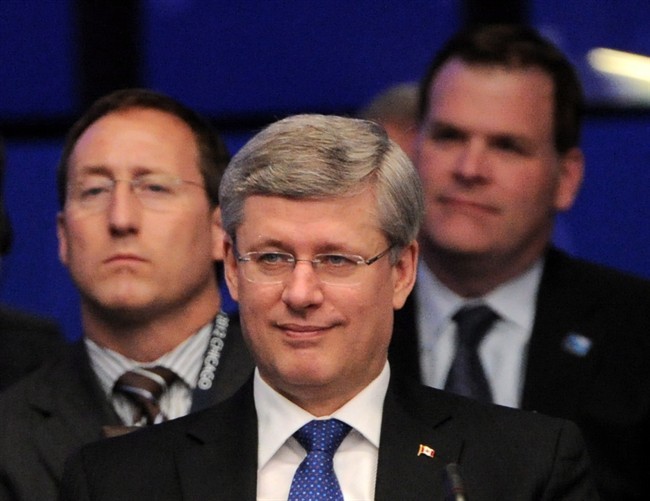 The Harper government wants to hide all of its secrets.
The Harper government wants to hide all of its secrets.While reviewing the latest edition of the federal government's little-known legislative bulletin, The Canada Gazette, Canadian Press reporter Jim Bronskill noticed a troubling detail: a new order is now on the table that would dramatically expand the number of current - and former - federal government employees under a lifetime gag order, potentially curbing the right to free expression for thousands of Canadians.
Smoke and mirrors cloak carbon emissions bottom line
It seems unlikely that poor Jacques Gourde, the hapless backbencher from Quebec, would have the heft to cripple Canada’s economy. But if you follow the chain of logic from the House of Commons, to Washington, D.C., and back again, with a detour through North American climate politics, that is where you end up. If Western Canadian crude trades at a discount to the world price for a generation to come, it’s all Gourde’s fault. He and others like him.
Bring Canada’s Parliament under Access to Information Act
The simmering scandal over the spending habits of Canada’s senators and the broader public debate over government accountability have exposed a significant flaw in Canada’s once world-leading Access to Information Act — its limited coverage. Canadians expect their public institutions to be accountable, open and transparent. At present however — and this will astound and perplex many Canadians — the act does not cover all institutions that spend taxpayers’ money or perform public functions. One such institution is Parliament itself — the seat of our democracy.
Dissatisfied chiefs could form new First Nations group
Tensions between the Assembly of First Nations and some chiefs who are feeling excluded could boil over next month at a meeting where a new breakaway organization could be born.
The National Treaty Gathering at Onion Lake, Sask., is taking place July 14 to 18, at the same time the AFN is having its annual meeting in Whitehorse. People will have to choose which meeting they want to attend.
The National Treaty Gathering at Onion Lake, Sask., is taking place July 14 to 18, at the same time the AFN is having its annual meeting in Whitehorse. People will have to choose which meeting they want to attend.
MP Dean Del Mastro donor records seized in election probe
Records obtained from Elections Canada suggest the agency has deepened its investigation into donations to Conservative MP Dean Del Mastro.
Lists of contributors to Del Mastro's 2008 federal campaign have been seized by the commissioner of Canada Elections, the records show. If the commissioner thinks criminal charges are warranted, he can refer the case to the director of public prosecutions, who decides whether to press charges.
Lists of contributors to Del Mastro's 2008 federal campaign have been seized by the commissioner of Canada Elections, the records show. If the commissioner thinks criminal charges are warranted, he can refer the case to the director of public prosecutions, who decides whether to press charges.
Unmasking Bill C-309: Newly passed legislation threatens freedom of expression
Last week, Bill C-309, the 'Preventing Persons from Concealing Their Identities during Riots and Unlawful Assemblies Act,'
was given royal assent. Also known as the "Mask Legislation," the law
makes it illegal to incite a protest wearing a mask or any face
covering, including face paint.
Wearing any type of face covering while participating in a riot or "unlawful assembly" can lead to criminal conviction. Despite opposition from Civil Liberties activists, the law has moved maximum penalty from five years to ten years in prison if convicted.
Wearing any type of face covering while participating in a riot or "unlawful assembly" can lead to criminal conviction. Despite opposition from Civil Liberties activists, the law has moved maximum penalty from five years to ten years in prison if convicted.
The CRTC has made a mistake: Bell's takeover of Astral will hurt the media
Public interest group OpenMedia.ca is condemning today's CRTC
decision to allow big media giant Bell to take over Astral Media.
Thousands of Canadians have spoken out against the takeover, because it
will lead to lost jobs, fewer media and telecom choices, higher prices,
and less opportunity for free expression.
Just four large, unaccountable Big Media conglomerates (Bell, Quebecor, Rogers, and Shaw) control over 86 per cent of Canadian cable and satellite distribution, 70 per cent of wireless revenues, and 54 per cent of Internet service revenues -- making Canada the most concentrated media market out of all G8 countries. Today's decision means Canada falling even further behind the rest of the G8. Canadians pay high prices for poor content and services because of this lack of real choice.
Just four large, unaccountable Big Media conglomerates (Bell, Quebecor, Rogers, and Shaw) control over 86 per cent of Canadian cable and satellite distribution, 70 per cent of wireless revenues, and 54 per cent of Internet service revenues -- making Canada the most concentrated media market out of all G8 countries. Today's decision means Canada falling even further behind the rest of the G8. Canadians pay high prices for poor content and services because of this lack of real choice.
Republican response on gay marriage a spectacular display of intolerance
Wisely, House Speaker John Boehner and the rest of the Republican leadership on Wednesday resisted the politician’s natural attraction to swarms of television cameras.
Shortly after the Supreme Court issued what amounted to a judicial declaration of equality for gay Americans wishing to marry, Boehner issued a short, restrained statement.
Shortly after the Supreme Court issued what amounted to a judicial declaration of equality for gay Americans wishing to marry, Boehner issued a short, restrained statement.
The trouble with algorithms
There’s a special Canadian wrinkle to the general argument used to rebuff critics of massive government spying on private communications: your phone calls, emails, etc. The argument goes: if you aren’t doing anything wrong, you have nothing to fear. The Canadian wrinkle has to do with the environment.
The National Post’s Jen Gerson interviewed a U.S. privacy expert. She asked about the PRISM program, by which U.S. agencies spy on Internet activity based outside the U.S., but which routinely rebounds back into the U.S. He said, “ . . . if we have intel that a reporter in Vancouver is a terrorist or whatever we’re going to ask for communications from the U.S. to Vancouver over this time period. They can get that, run an algorithm to see who’s been talking to X, Y, Z, maybe see your email address and your email to me . . .”
The National Post’s Jen Gerson interviewed a U.S. privacy expert. She asked about the PRISM program, by which U.S. agencies spy on Internet activity based outside the U.S., but which routinely rebounds back into the U.S. He said, “ . . . if we have intel that a reporter in Vancouver is a terrorist or whatever we’re going to ask for communications from the U.S. to Vancouver over this time period. They can get that, run an algorithm to see who’s been talking to X, Y, Z, maybe see your email address and your email to me . . .”
Alberta flood coverage misses the point
The media would have us believe the story of the Alberta floods is about the indomitability of the human spirit in the face of unprecedented adversity. That may be correct, but the truth is as much about our ability to create disaster as to overcome it.
Undoubtedly the catastrophic events of recent weeks were the result of unusual if not unique circumstances, but the fact is the floods were also a result of human actions, or should we say, lack thereof.
Undoubtedly the catastrophic events of recent weeks were the result of unusual if not unique circumstances, but the fact is the floods were also a result of human actions, or should we say, lack thereof.
Senate defiance or an outbreak of Senate sobriety?
For their final act in their season of shame, the trained Conservative seals in the Senate finally found a ball they would not bounce off their nose.
By slicing and dicing a sloppy, mean-spirited government anti-union bill on a steamy summer afternoon, the Red Chamber was starring in a “revenge of the Senate” saga, one that has repercussions for the three parties in the House of Commons and their respective positions on the future of the Senate.
By slicing and dicing a sloppy, mean-spirited government anti-union bill on a steamy summer afternoon, the Red Chamber was starring in a “revenge of the Senate” saga, one that has repercussions for the three parties in the House of Commons and their respective positions on the future of the Senate.
Short B.C. throne speech neglects climate crisis, poverty
Everyone expected today's throne speech to be a brief recap of Christy Clark's election platform. And on this front, it certainly delivered: only eight pages, compared to the usual 20+, pinning our province's hopes on liquified natural gas (LNG) exports, and using much of the same language, word for word, that we've heard repeatedly throughout the election campaign.
A recycled throne speech warrants recycled analysis, so here's an excerpt from what I wrote on this blog in February:
"the throne speech disappoints with its failure to honestly communicate the true challenges our province faces, let alone offer credible solutions. Too many children live in poverty in our rich province, our hospitals are overcrowded, our schools cannot afford to provide kids with learning disabilities and special needs with the support they need to learn well, there’s a crisis in seniors care, and climate change and income inequality threaten not just our sensibilities, but our economy, quality of life and survival. But while natural gas is mentioned 15 times in the throne speech, and mining and forestry also feature prominently, there is no mention of climate change, green jobs or income inequality."
A recycled throne speech warrants recycled analysis, so here's an excerpt from what I wrote on this blog in February:
"the throne speech disappoints with its failure to honestly communicate the true challenges our province faces, let alone offer credible solutions. Too many children live in poverty in our rich province, our hospitals are overcrowded, our schools cannot afford to provide kids with learning disabilities and special needs with the support they need to learn well, there’s a crisis in seniors care, and climate change and income inequality threaten not just our sensibilities, but our economy, quality of life and survival. But while natural gas is mentioned 15 times in the throne speech, and mining and forestry also feature prominently, there is no mention of climate change, green jobs or income inequality."
Subscribe to:
Comments (Atom)


